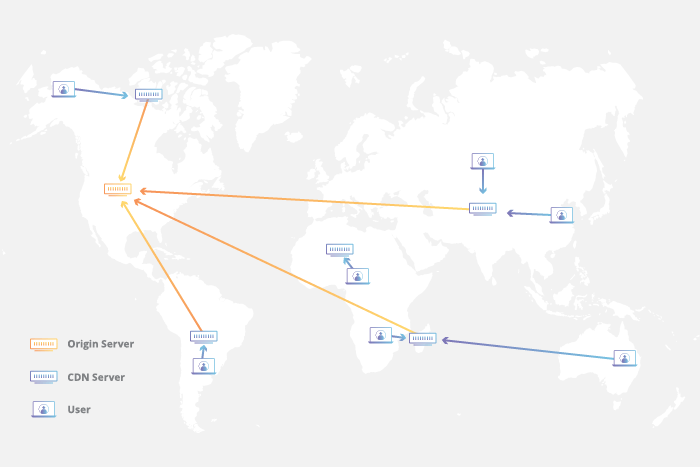A content delivery network (CDN) is a group of geographically distributed servers that work together to provide fast distribution of Internet content.
A CDN enables the rapid transfer of resources needed to load Internet content, including HTML pages, javascript files, style sheets, images, and videos.
The popularity of CDN services continues to grow, and today the majority of web traffic is served by CDNs, including traffic from major sites such as Facebook, Netflix, and Amazon.
A properly configured CDN can also help protect websites from some common malicious attacks, such as distributed denial of service (DDOS) attacks.
Does a CDN work as a host?
Even though a CDN does not host content and cannot replace the need for proper web hosting, it allows content to be cached at the network edge, which improves website performance.
Many websites struggle to meet their performance needs with traditional hosting services, which is why they opt for CDNs.
By using caching to reduce hosting bandwidth, avoid downtime, and improve security, CDNs are a popular choice for relieving some of the major issues associated with traditional web hosting.
What are the benefits of using a CDN?
Bien que les avantages d’utiliser un CDN varient en fonction de la taille et des besoins d’une propriété Internet, les principaux avantages pour la plupart des utilisateurs peuvent être décomposés en 4 composants différents:
- Improved website load times – By distributing content closer to site visitors using a nearby CDN server (among other optimizations), visitors benefit from faster page load times. Since visitors are more likely to leave a slow-loading site, a CDN can reduce bounce rates and increase the time users spend on the site. In other words, a faster website means that more visitors will stay and stay longer.
- Reduced bandwidth costs – Bandwidth consumption costs for website hosting is a major expense for websites. Through caching and other optimizations, CDNs can reduce the amount of data an origin server has to provide, thereby reducing hosting costs for website owners.
- Increased content availability and redundancy – Large amounts of traffic or hardware failures can interrupt the normal operation of the website. Because of their distributed nature, a CDN can handle more traffic and withstand hardware failures better than many origin servers.
- Improved website security A CDN can improve security by providing DDoS mitigation, security certificate enhancements, and other optimizations.
How does a CDN work?
A CDN is essentially a network of servers connected together in order to provide content that is as fast, economical, reliable and secure as possible. In order to improve speed and connectivity, a CDN will place servers at exchange points between different networks. These Internet Exchange Points (IXPs) are the main connection locations of different Internet providers in order to provide each other with access to traffic from their different networks. By having a connection to these high-speed, highly interconnected locations, a CDN provider is able to reduce the costs and transit times of high-speed data transmission.

Latency – How does a CDN improve a website's load times?
When it comes to websites that load content, users quickly give up when a site slows down.
CDN services can help reduce load times in the following ways: The globally distributed nature of a CDN means reducing the distance between users and website resources. Instead of having to connect to where the website's origin server is installed, a CDN allows users to connect to a geographically closer data center.
Less travel time means faster service. Hardware and software optimizations, such as efficient load balancing and solid-state hard drives, allow data to reach the user faster.
CDNs can reduce the amount of data transferred by reducing file size using tactics such as file minimization and compression. Small file sizes mean faster load times.
CDNs can also speed up sites using TLS/SSL certificates by optimizing connection reuse and enabling fake TLS boot.
Explore all the ways a CDN can speed up website loading.
Reliability and redundancy – How does a CDN keep a website always online?
Availability is an essential element for anyone who owns an Internet property. Hardware failures and traffic spikes resulting from malicious attacks or simply a resurgence in popularity can potentially cause a web server to crash and prevent users from accessing a site or service.
A well-balanced CDN has several features that will minimize downtime: load balancing distributes network traffic evenly across multiple servers, making it easier to scale up rapid traffic increases. Intelligent failover provides uninterrupted service even if one or more CDN servers disconnect due to hardware malfunction.
Failover can redistribute traffic to other operational servers. If an entire data center encounters technical issues, Anycast routing forwards traffic to another available data center, ensuring that no user loses access to the website.
How does a CDN protect data?
Information security is an integral part of a CDN.
A CDN can maintain a secure site with new TLS/SSL certificates, which ensure a high level of authentication, encryption, and integrity.
How does a CDN reduce bandwidth costs?
Each time an origin server responds to a request, bandwidth is consumed. Learn how a CDN, like the Cloudflare CDN, reduces original requests. (coming soon)

